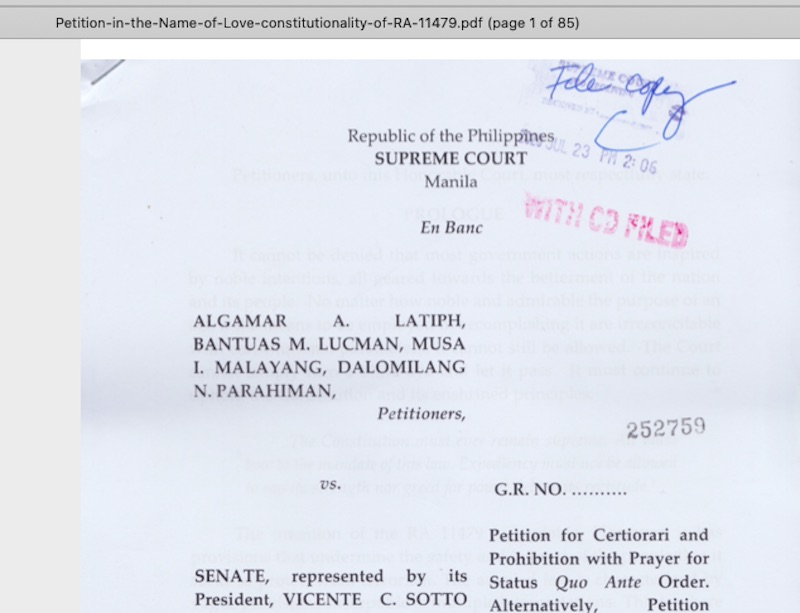QUEZON CITY (MindaNews / 15 August) — July 23, 2020 was a fantastic day for the four of us upon, finally, filing our petition questioning a law that would be used, as a tool, to legitimize curtailment of our liberty and freedom. And love.
The Anti-Terrorism Act of 2020 will, most likely, victimize innocent Moro.
***
There is “love” written in the petition. And we are not sure if it will persuade, or elicit annoyance from the justices.
Seemingly a misplaced word in a petition of constitutional in nature; but “love” was not inscribed there as mere embellishment. It is there to serve its very literal purpose.

***
One of the core issues that we posed was the power reposed to law enforcers to arrest and detain any person based on bare suspicion.
There is arbitrariness in the determination of “suspect.”[1] And the law enforcers were made as judge, jury, and executioner of the law. I did not wish to discuss it, in length, since legal jargon is boring. And will probably summon yawns.
In the petition, we presented, first, the existing prejudice against Moro which tends to make the enforcement of the law discriminative; and, second, actual cases of innocent Moro, who were arrested and detained, but freed by courts because of mistaken identity.
As for mistaken identity, we cited a case,[2] being tried up to this present for 18 years, showing 41 innocent Moro who are victims of mistaken identity.
Ironically, the 41 innocent men were detained, in aggregate, for nearly one century. And for, nearly two decades of trial, it is yet to convict any accused.
It is also the case where most of the accused died during the Bicutan Siege in 2005. And the Commission on Human Rights found, in a resolution, that excessive force was used and rights to life were violated.[3]
***
It was the element of prejudice in the application of law that made “love” find its place in the petition.
Prejudice did not come into existence in haste as the seeds of prejudice, against the Moro, were consciously planted as far back as 300 years ago.
It was when the colonial Spaniards stigmatized its subjects by slurring Moro as uncivilized and savages. It utilized various forms of medium.
One of which, the most glaring, is the Moro-Moro play, started in the 16thcentury, and performed during a week-long social-religious and cultural festivities in barrios all over the colonial Philippines; it remained popular in other places in the country up to this day
***
In that play, Moro is portrayed as villain, and their defeat is its highlight as a happy ending.
We have cited a diligent researcher who reviewed eight scripts in Cebuano Study Center and found adjectives describing Moro as “evil,” “ill-mannered,” “un-baptized,” “uneducated,” “cowardly,” “cruel,” and among many others.[4]
***
We asserted that our argument of prejudice is not unfounded. We presented a Pulse Asia survey which found that “majority of Filipinos think that Muslims are probably more prone to run amok (55%).And a plurality believe that Muslims are probably terrorists or extremists (47%).”[5]
***
And even in Supreme Courr decisions, Moro Moro has become part of its judicial literature.
We quote: “a ‘moro-moro’ could not possibly result in a just or valid decision…[6] a moro-moro or mock trial…[7] kangaroo…[8] mock trial… [9] rig (moro-moro) the trial.”[10]
Even the late President Marcos was cited, in a decision, saying:“Okay, mag moro-moro na lamang kayo.” [11]
***
We referred to a Supreme Court decision[12] declaring that stereotyping has not only “caused internal conflict” but also “inhuman treatment of Filipinos of a different faith from the majority.”
We wrote in the petition: “’Muslim na mananakop,’ [13] uttered by former Secretary Manuel Roxas II, DILG, during the Zamboanga Siege in 2013. This stereotyping shows how deep his prejudice towards Muslims. Even at his stature such unbecomingness was entirely unexpected.”
***
But former Sec. Roxas is not alone.
The Supreme Court, during the colonial era, said that: “in consideration of the race [of the Moro] to which the defendant belongs, his barbarous and savage customs, and his absolute lack of education and culture.” [14] In another case it described “accused [a Moro] is a member of an uncivilized tribe.”[15] Still in another case, it depicted two Moro accused to have “shown to be members of an uncivilized or semi-civilized tribe.” [16]
Nonetheless, we were grateful when, this year, the Court speaking thru Justice Marvic Leonen penned:“[j]ust because a community outside of Mindanao is predominantly Muslim does not mean that it should be considered presumptively ‘notorious.’” [17]
And then chastised the Office of the Solicitor General when it wrote, in its pleading, the following: “the apprehending team would be putting their lives in peril considering that the area where the buy-bust operation was conducted is a ‘notorious Muslim community.’” [18]
The Court rebuked the OSG, in italic case, that it should: “be circumspect in its language. This averment from the Solicitor General exhibits biased, discriminatory, and bigoted views; unbecoming of a public’ official mandated to act with justice and sincerity, and who swore to respect the rights of persons. This is the kind of language that diminishes the public’s trust in our state agents. These are the words that when left unguarded, permeate in the public’s consciousness, encourage further divide and prejudices against the religious minority, and send this country backward. “[19]
***
We pleaded the Court that our apprehension on abuse and arbitrariness in the enforcement of the vague law are not premised on empty facts. We have cases of mistaken identity involving innocent Moro who were subsequently freed. And presenting also the prejudice in the enforcement of the law. We said that in the arrest and detention of innocent Moro, it is widespread and systemic.
***
I myself, with a practice in the Supreme Court, am not sure how the facts that we presented can be the basis in declaring the law unconstitutional.
The Court will only read the letter of the law and the Constitution, and it will not belabor itself to consider factual evidence to support its decision in upholding the constitutionality or unconstitutionality of the law.
Then, why would we bother ourselves in discussing the facts on mistaken identity and issues pertinent to prejudice occupying 25 out of 82 pages of the petition when we knew, priorly, the futility of such efforts?
Somehow it is worthless.
But in the name of “love,” for us, it is worth writing. This is where “love” comes into play.
But I guess, I am becoming verbose, as usual. And I hope that my apology is proper, at this juncture, because I will continue to finish it in the next post.
Perhaps.
(MindaViews is the opinion section of MindaNews. ‘Bangsamoro Speaks’ is open to any Bangsamoro who wants to speak up on any issue affecting the Bangsamoro people.
Algamar A. Latiph is a peace advocate and Moro human rights lawyer. After several years in government service including a stint as chair of the Regional Human Rights Commission of the defunct Autonomous Region in Muslim Mindanao, he served consultant to public officials in the ARMM and the Bangsamoro Autonomous Region in Muslim Mindanao. He was a Chevening Fellow at the University of Birmingham, United Kingdom in 2007, attended Conflict, Human Rights and Transitional Justice at Geneva Academy of International Human Rights in 2014 and in the same year, the Summer School on International Criminal Law at Leiden University, The Hague. This piece was first published on his FB page on August 9. The author sent MindaNews an updated version, with footnotes).
[1] Article 29, RA 11479.
[2] People vs. Radullan Sahiron et al Crim. Case NO. 128923-H pending before Regional Trial Court of Taguig City Branch 271.
[3] See CHR finds police response to Bicutan siege ‘excessive’ (27 March 2006), The PCIJ Blog.
https://old.pcij.org/blog/2006/03/27/chr-finds-police-response-to-bicutan-siege-excessive (accessed on 10 July 2020)
[4] Pacana, N.R., The Moro In The Moro Moro: Hegemonic Representation In The Linambay Plays In Cebu, Philippine Quarterly of Culture and SocietyVol. 35, No. 1/2, Special Issue: Critical Heritage (March/June 2007), pp. 87-99. (accessed 14 July 2020) < https://www.jstor.org/stable/29792610?read-now=1&refreqid=excelsior%3A44a57007f49bddb389b14a18ab2ec3b0&seq=11#page_scan_tab_contents>
[5] Philippine Institute for Development Studies (July to Aug 2006), The Bias Against Muslims: A Creeping Perception. Quezon, Vol. XXIV No. 4. <Accessed on 11 July 2020 at https://pidswebs.pids.gov.ph/CDN/PUBLICATIONS/pidsdrn06-4.pdf> (accessed 12 July 2020)
[6] Saturnina Galman v. Sandiganbayan, GR No. 72670, 12 Sep 1986. Justice Guitieriez, Concurring.
[7] Id.
[8]Visayan Electric Company Employees Union vs. VECO, G.R. No. 205575, 22 July 2015.
[9] Miguel Argel v. Judge Herminia M. Pascua, AM No. RTJ-94-1131, Aug 20, 2001
[10] Ceferino A. Soriano vs. Adoracion C. Angeles, GR No. 109920, 31 Aug 31, 2000.
[11] Saturnina Galman v. Sandiganbayan, GR No. 72670, 12 Sep 1986.
[12] People of the Philippines vs. Gilbert Sibelleno y Casabar, G.R. No. 221457. January 13, 2020.
[13] Esguerra, A. (21 March 2016) Mar Roxas hit for ‘Trumped’ ‘Muslim na mananakop’ remark, Philippine Daily Inquirer, 21 Mach 2016, <Available at: https://newsinfo.inquirer.net/775419/mar-roxas-hit-for-trumped-muslim-na-mananakop-remark>, 11 July 2020.
[14] The United States vs. The Moro Jakan Tucko, G.R. No. 6635, 14 September 1911.
[15] The United States vs. Moro Jamad, G.R. No. L-12678, 15 December 1917.
[16] The United States vs. Nalua and Kadayum, G.R. No. L-7311, 5 August 1912.
[17] People of the Philippines vs. Gilbert Sibelleno y Casabar, G.R. No. 221457. January 13, 2020.
[18] Id.
[19] Id.







